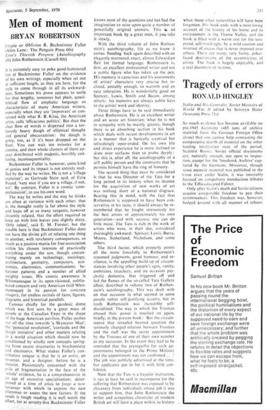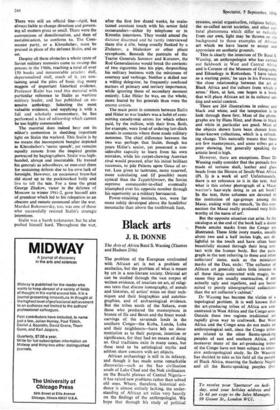Tragedy of errors
RONALD HINGLEY
Stalin and His Generals: Soviet Memoirs of World War II edited by Seweryn Bialer (Souvenir Press 75s) So much es idence has become available on pre-1945 Germany (485 tons of archive material from the German Foreign Office alone) that one cannot help contrasting the comparative dearth of material on the other leading totalitarian state of the period, Stalinist Russia. Soviet official documents are, naturally enough, not open to inspec- tion, except for the 'Smolensk Archive' cap- tured by the Germans. Moreover, though some memoir material was published in the USSR even under Stalin, it was inevitably focused on compulsory mendacious tributes to the Tiflis-educated Ffihrer.
Only after Stalin's death did Soviet citizens acquire comparable freedom to pen their reminiscences. This freedom was, however, hedged around with all manner of taboos. There was still an official line—rigid, but always liable to change direction and govern- ing all matters great or small. There were the conventions of destalinisation, and then of restalinisation, to conform to. The Com- munist party, or a Khrushchev. must be praised in place of the defunct Stalin, and so on.
Despite all these obstacles a whole spate of Soviet military memoirs came to swamp the presses in the 1960s, reaching a total of over 150 books and innumerable articles: dull, depersonalised stuff, much of it. yet con- taining amid the piles of basic slag many nuggets of important historical evidence. Professor Bialer has read this material with particular reference to Stalin as wartime military leader, and has published an ex- tensive anthology. Selecting the most valuable evidence, and supplying it with a full and scholarly commentary, he has performed a feat of editorship which cannot be too highly commended.
The material does indeed bear out its editor's contention in shedding important light on Stalin the warlord. This Stalin is by no means the incompetent bungler depicted in Khrushchev's 'secret speech', yet remains equally remote from the inspired genius portrayed by hagiographers. Stalin was high- handed, abrupt and inscrutable. He treated his generals as schoolboys, or executed them for sustaining defeats due to his own lack of foresight. However, an occasional brass-hat did stand up to the pockmarked bully and live to tell the tale. For a time the great George Zhukov, victor in the defence of Moscow in winter 1941-2, gave himself airs of grandeur which led to his relegation to an obscure and remote command after the war. Marshal Rokossovsky, too, was one of those who successfully resisted Stalin's strategic intentions.
Stalin was a harsh taskmaster, but he also pushed himself hard. Throughout the war,
after the first few dazed weeks, he main- tained constant touch with his senior field commanders—either by telephone or in Kremlin interviews. They would attend the dictator disarmed and he rarely interviewed them tete a tete, being usually flanked by a Zhdanov, a lvtalenkov or other pliant sycophants. Beneath the portraits of the Tsarist Generals Suvorov and Kutuzov, the Red Generalissimo would break the contents of two cigarettes into his pipe, despatching his military business with the minimum of courtesy and verbiage. Neither a skilled nor a willing delegator, he frequently confused matters of primary and tertiary importance, while ignoring those of secondary moment entirely. Like Hitler he was, on the whole, more feared by his generals than were the enemy armies.
The main point in common between Stalin and Hitler as war leaders was a habit of com- mitting cataclysmic errors for which others paid, by the million, with their lives. Both, for example, were fond of ordering last-ditch stands in contexts where these made military nonsense. The chief difference between the two was perhaps that Stalin, though ten years Hitler's senior, yet possessed a con- siderable capacity to learn from his own mistakes, while his carpet-chewing Austrian rival would proceed, after his initial brilliant successes, to pile Pelions upon Ossas of er- ror. Less given to tantrums, more reserved, more calculating and (if possible) more cynical than the Teppichfresser, the Soviet supreme commander-in-chief eventually triumphed over his opposite number through his superiority as a military bureaucrat.
Power-retaining instincts, too, were far more subtly developed above the handlebar moustache than above the toothbrush fuzz.































 Previous page
Previous page